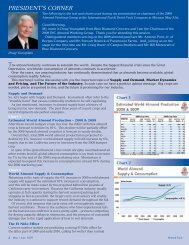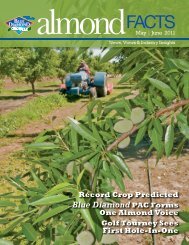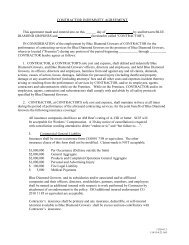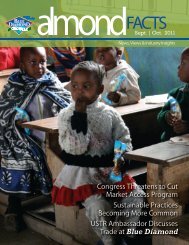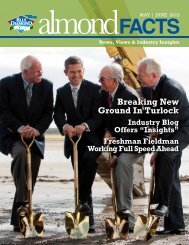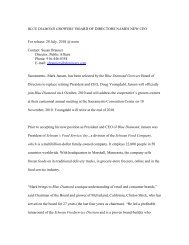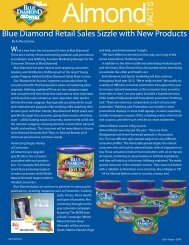View the PDF - Blue Diamond Growers
View the PDF - Blue Diamond Growers
View the PDF - Blue Diamond Growers
You also want an ePaper? Increase the reach of your titles
YUMPU automatically turns print PDFs into web optimized ePapers that Google loves.
AgriculturalCouncil of CaliforniaEMILY ROONEY, PresidentCreating Our Nichein <strong>the</strong> Next Legislative SessionAGRICULTURAL COUNCIL OF CALIFORNIAAs we approach <strong>the</strong> holiday season, we can all be thankful for <strong>the</strong> postelectionpeace, free of political advertising and posturing. Reflectingon <strong>the</strong> recent election, <strong>the</strong>re are some lessons <strong>the</strong> staff and membersof Agricultural Council of California (Ag Council) must keep in mind.In <strong>the</strong> national races, one has to wonder if we are facing post-election “fallout,”or really just more of <strong>the</strong> same? The close presidential election was proof thatas a nation, we have an almost equally divided populace when it comes to partyaffiliation. “Swing” states and independent voters were actively courted by bothcandidates. The results of <strong>the</strong> most expensive election on record helped validate<strong>the</strong> approach Ag Council has taken in reaching out to California lawmakers. Partyaffiliation is a line we have to continue to bridge and cross in order to make sure allof California’s lawmakers know <strong>the</strong> value of agriculture to <strong>the</strong> state’s success.In <strong>the</strong> Legislature, Democrats now hold a two-thirds supermajority in <strong>the</strong> stateSenate. While a few close races remain undecided, it appears Democrats mayalso have a veto-proof majority in <strong>the</strong> Assembly. A supermajority gives onepolitical party <strong>the</strong> ability to override vetoes, avoid deadlines and more easily placeconstitutional changes on <strong>the</strong> ballot. This underscores <strong>the</strong> need to reach out tomoderate legislators to ensure that California’s position as <strong>the</strong> number-one ageconomy is secure.Even if both <strong>the</strong> state Senate and Assembly consist of a supermajority for<strong>the</strong> next legislative session, it will be razor-thin. We are hopeful that throughcontinued advocacy, we will be able to influence <strong>the</strong> more reasonable lawmakersto vote with us on our key issues pertaining to labor, water, environmental andfiscal matters. This will not be an easy task, but perhaps <strong>the</strong> most-savvy legislatorswill be encouraged to employ more moderate behavior.»Screenshot from NoProp37.comAg Council’s Board ofDirectors voted to take anofficial position on two ballotmeasures. Proposition 32,which Ag Council was infavor of, unfortunately failedwith only 43.9 percent ofCalifornians voting in supportand 56.1 percent in opposition.Proposition 32 would have bannedcorporations and public andprivate sector unions from usingpayroll-deducted funds for politicalpurposes and prohibited unionsand corporations from directlycontributing to political candidates.Ag Council is pleased <strong>the</strong>controversial geneticallymodified organism (GMO)labeling measure, Proposition37, was voted down with 53.1percent opposing and 46.9percent supporting <strong>the</strong> measure.Proposition 37 would havemandated labeling of raw orprocessed food as geneticallyengineered under certainparameters.Ag Council opposed Proposition37 because it created a privateright of action against familyfarmers and food processors,increased <strong>the</strong> cost of food forconsumers, and prohibitedmarketing as “natural” anyproducts that are processedin any way, even if a cropis not genetically modified.Proposition 37 also containednumerous exemptions.36 Almond Facts NOVEMBER | DECEMBER 2012





